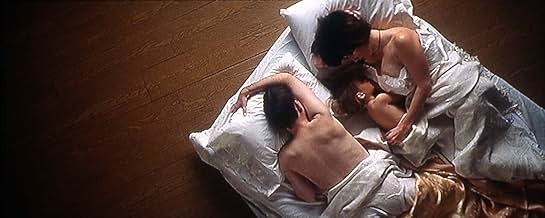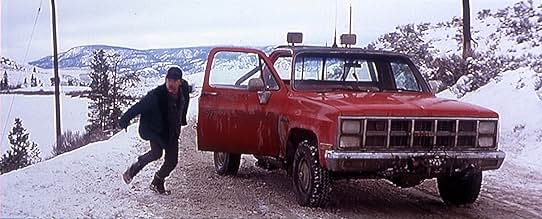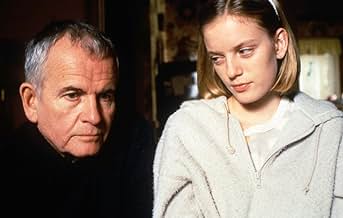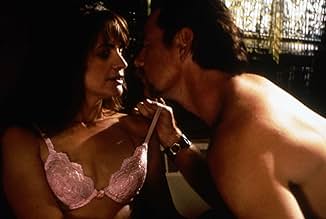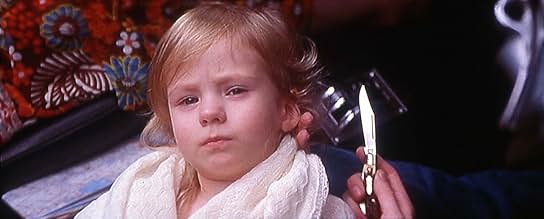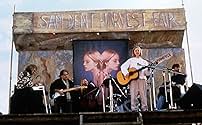IMDb रेटिंग
7.4/10
38 हज़ार
आपकी रेटिंग
एक छोटे से शहर में एक बस दुर्घटना परिवारों की रक्षा के लिए एक वकील को शहर में लाती है, लेकिन उसे पता चलता है कि सब कुछ वैसा नहीं है जैसा लगता है.एक छोटे से शहर में एक बस दुर्घटना परिवारों की रक्षा के लिए एक वकील को शहर में लाती है, लेकिन उसे पता चलता है कि सब कुछ वैसा नहीं है जैसा लगता है.एक छोटे से शहर में एक बस दुर्घटना परिवारों की रक्षा के लिए एक वकील को शहर में लाती है, लेकिन उसे पता चलता है कि सब कुछ वैसा नहीं है जैसा लगता है.
- 2 ऑस्कर के लिए नामांकित
- 34 जीत और कुल 56 नामांकन
फ़ीचर्ड समीक्षाएं
Mitchell Stephens (Ian Holm) is a lawyer struggling with his drug addicted daughter. He's trying to convince various parents to sue the town. They lost their children when the school bus driven by Dolores Driscoll (Gabrielle Rose) gets into an accident on a snow covered road. The town is the only one with deep pockets and Mitchell will say anything to get them to sue. Nicole Burnell (Sarah Polley) is a survivor who was sexually corrupted by her father.
This movie meanders a lot. There are long flashbacks of not only the bus ride and crash but also some of the life before that day. It has an ethereal dreamlike quality about it. It has the sad moody devastation. It doesn't make it a compelling watch unless seeing the saddest people in the world is fun for you.
This movie meanders a lot. There are long flashbacks of not only the bus ride and crash but also some of the life before that day. It has an ethereal dreamlike quality about it. It has the sad moody devastation. It doesn't make it a compelling watch unless seeing the saddest people in the world is fun for you.
I re-watched The Sweet Hereafter on video last night, and am still haunted by it today. It is structured so that you know some of the basic tragic plot near the beginning. This caused my eyes to water at some of the beautiful lyrical overhead tracking shots of the school bus winding through the snow covered roads of the Pacific northwest.
The film switches between the time that the lawyer arrives in town to "help" the families receive compensation, and to days just prior to the accident. We witness a loving "hippie" couple who has adopted a beautiful Native American boy, a loving mother of a school phobic learning disabled boy, and a widower who loves his two children a great deal and sees them off to school by following them in his truck. This same widower is having an affair with the mother of the school phobic--she is unhappily married to a "pig" of a husband. Complicating matters is the father who obviously loves his teenage daughter in Lolita-like fashion.
Part of the theme of The Sweet Hereafter is similar to Magnolia--accidents do happen--perhaps no one at fault... or perhaps all the adults had some part in it without anyone being at fault, as only the innocent children were killed.
The town had changed... tragedy has taken away the town's joy and innocence. The parents are no longer open with each other, but guarded, suspicious... in deep grief.
The lawyer is little more than an ambulance chaser, attempting to profit off their tragedy. Yet, he, too is a tragic figure who has already "lost" his daughter--
He had saved her when she was a baby, yet she has now turned away from him... and his feelings are now ambivalent towards her--he is a grief-stricken, defeated father, who vascillates between wanting to talk with his daughter on his cell phone and deciding to cut her off.
The story of the Pied Piper is interweaved between various events in the movie to give greater depth to the story. There's also a great scene in the movie between the lawyer and the garage mechanic, who has lost his two children, that shows that the theme is much broader than the literal story:
"I'm telling you this because... we've all lost our children, Mr. Ansel. They're dead to us. They kill each other in the streets. They wander comatose in shopping malls. They're paralyzed in front of televisions. Something terrible has happened that's taken our children away. It's too late. They're gone."
This movie isn't for everyone. It's a serious, layered piece with a lot of melancholy. The kind of fare that film critics can love, but Academy voters will avoid. But what it strives to accomplish is done very well. And it will stay with you long after the final scenes have appeared.
The film switches between the time that the lawyer arrives in town to "help" the families receive compensation, and to days just prior to the accident. We witness a loving "hippie" couple who has adopted a beautiful Native American boy, a loving mother of a school phobic learning disabled boy, and a widower who loves his two children a great deal and sees them off to school by following them in his truck. This same widower is having an affair with the mother of the school phobic--she is unhappily married to a "pig" of a husband. Complicating matters is the father who obviously loves his teenage daughter in Lolita-like fashion.
Part of the theme of The Sweet Hereafter is similar to Magnolia--accidents do happen--perhaps no one at fault... or perhaps all the adults had some part in it without anyone being at fault, as only the innocent children were killed.
The town had changed... tragedy has taken away the town's joy and innocence. The parents are no longer open with each other, but guarded, suspicious... in deep grief.
The lawyer is little more than an ambulance chaser, attempting to profit off their tragedy. Yet, he, too is a tragic figure who has already "lost" his daughter--
He had saved her when she was a baby, yet she has now turned away from him... and his feelings are now ambivalent towards her--he is a grief-stricken, defeated father, who vascillates between wanting to talk with his daughter on his cell phone and deciding to cut her off.
The story of the Pied Piper is interweaved between various events in the movie to give greater depth to the story. There's also a great scene in the movie between the lawyer and the garage mechanic, who has lost his two children, that shows that the theme is much broader than the literal story:
"I'm telling you this because... we've all lost our children, Mr. Ansel. They're dead to us. They kill each other in the streets. They wander comatose in shopping malls. They're paralyzed in front of televisions. Something terrible has happened that's taken our children away. It's too late. They're gone."
This movie isn't for everyone. It's a serious, layered piece with a lot of melancholy. The kind of fare that film critics can love, but Academy voters will avoid. But what it strives to accomplish is done very well. And it will stay with you long after the final scenes have appeared.
Lately I've been seeing just about every movie that someone recommends to me, and "the Sweet Hereafter" has been on quite a few of my friends' lists. I was excited about finally seeing the movie.
What I found was less compelling than I expected. None of the characters were really engaging, and perhaps that's the aim of the film. But I honestly can't understand how this movie could have made people cry. Who did they identify with? Ian Holm's character, whose grimacing and silence set my teeth on edge, and whose attitude toward the families of the accident victims was so entirely self-serving? Sarah Polley's character, who almost never displayed any spark of life? And even if I had begun to identify with one character or another, I would have been instantly put off by the trite lines that kept coming out of their mouths. "Let me direct your rage?" Give me a break.
Not to imply too much of a connection between the films, but if you want to feel the terror and rage surrounding a tragedy as though you were there living through it, see "Boys Don't Cry." The words that go unsaid in that film are worth much more than those voiced-over or spoken all too clearly in "the Sweet Hereafter."
What I found was less compelling than I expected. None of the characters were really engaging, and perhaps that's the aim of the film. But I honestly can't understand how this movie could have made people cry. Who did they identify with? Ian Holm's character, whose grimacing and silence set my teeth on edge, and whose attitude toward the families of the accident victims was so entirely self-serving? Sarah Polley's character, who almost never displayed any spark of life? And even if I had begun to identify with one character or another, I would have been instantly put off by the trite lines that kept coming out of their mouths. "Let me direct your rage?" Give me a break.
Not to imply too much of a connection between the films, but if you want to feel the terror and rage surrounding a tragedy as though you were there living through it, see "Boys Don't Cry." The words that go unsaid in that film are worth much more than those voiced-over or spoken all too clearly in "the Sweet Hereafter."
I had to laugh or else I'd cry and not because a bus full of school children died.
I honestly can't imagine anyone being moved by this film. It is too distant to be involving, too vague to be meaningful, too slow to be engaging and too cold to be emotional. But boy, oh boy, is it funny.
The dialogue is so odd and unnatural that it becomes comical. Note the stagy way in which the detective's daughter talks. `Welcome to hard times, DADDY', `I like it when you don't believe me DADDY.' Come on, playing a drug addict is easy just watch Courtney Love and imitate. Zoe doesn't sound drugged out but she must be because she always calls from a payphone where police sirens blast in the background. And Zoe comes off well in comparison to the unintentionally hilarious stroke victim and the Otto's who put their heads together, dry-eyed and sniffle, expecting us to believe that they are crying over their long lost son named, Bear, of all things.
Bravo to the generic and lifeless Sarah Polley who musters a tiny ounce of oomph to deliver `the big lie' at the end you know, the one she said she would NEVER tell. She even attempts to glare at her father and later; if you look really close, it's the beginnings of a grin.
How ridiculous is the scene where Ian Holm recounts a spider bite story that goes absolutely NOWHERE? Why doesn't he remember Alison's father? Why does he get stuck in a CAR WASH? What is wrong with this guy?
And why is creepy Billy a saint for trying to convince Nicole's father not to sue? This anti-sue-happy town sure is unrealistic. Oh, they're Canadian. Thank explains it. Sure Ian Holm's acting is bad but does he really deserve the town's wrath for trying to gain a buck?
There is a really cheesy time transition scene, which illustrates how confused director Atom Egoyan is. He thinks the audience needs to be hand held in order to comprehend the passing of time and yet he fails to explain anything else in this perplexing tale with similar clarity.
Would people really behave the way these people do and what does it all mean anyway? Detective Stephens says that our children are all lost to us. The Pied Piper story echoes similar sentiments. Some school kids are dead while others grow up to become drug addicts and are as good as gone. One strange girl lives and because she tells a lie she is now, apparently, more pure than anyone else in town and well, that's it.
It is always wise to heed the immortal words of Radiohead don't get sentimental, it always ends up drivel. The Sweet Hereafter doesn't even have enough power to illicit the feelings that sentimentality requires. It is the worst kind of drivel -the kind that attempts to be profound, fails and stumbles into pretension, leaving nothing worthy of redemption in its wake.
I honestly can't imagine anyone being moved by this film. It is too distant to be involving, too vague to be meaningful, too slow to be engaging and too cold to be emotional. But boy, oh boy, is it funny.
The dialogue is so odd and unnatural that it becomes comical. Note the stagy way in which the detective's daughter talks. `Welcome to hard times, DADDY', `I like it when you don't believe me DADDY.' Come on, playing a drug addict is easy just watch Courtney Love and imitate. Zoe doesn't sound drugged out but she must be because she always calls from a payphone where police sirens blast in the background. And Zoe comes off well in comparison to the unintentionally hilarious stroke victim and the Otto's who put their heads together, dry-eyed and sniffle, expecting us to believe that they are crying over their long lost son named, Bear, of all things.
Bravo to the generic and lifeless Sarah Polley who musters a tiny ounce of oomph to deliver `the big lie' at the end you know, the one she said she would NEVER tell. She even attempts to glare at her father and later; if you look really close, it's the beginnings of a grin.
How ridiculous is the scene where Ian Holm recounts a spider bite story that goes absolutely NOWHERE? Why doesn't he remember Alison's father? Why does he get stuck in a CAR WASH? What is wrong with this guy?
And why is creepy Billy a saint for trying to convince Nicole's father not to sue? This anti-sue-happy town sure is unrealistic. Oh, they're Canadian. Thank explains it. Sure Ian Holm's acting is bad but does he really deserve the town's wrath for trying to gain a buck?
There is a really cheesy time transition scene, which illustrates how confused director Atom Egoyan is. He thinks the audience needs to be hand held in order to comprehend the passing of time and yet he fails to explain anything else in this perplexing tale with similar clarity.
Would people really behave the way these people do and what does it all mean anyway? Detective Stephens says that our children are all lost to us. The Pied Piper story echoes similar sentiments. Some school kids are dead while others grow up to become drug addicts and are as good as gone. One strange girl lives and because she tells a lie she is now, apparently, more pure than anyone else in town and well, that's it.
It is always wise to heed the immortal words of Radiohead don't get sentimental, it always ends up drivel. The Sweet Hereafter doesn't even have enough power to illicit the feelings that sentimentality requires. It is the worst kind of drivel -the kind that attempts to be profound, fails and stumbles into pretension, leaving nothing worthy of redemption in its wake.
I've seen this film twice now, and had the same reaction both times, so it's not out of gut reaction that I label "The Sweet Hereafer" an odious piece of simple-minded garbage.
The central idea (a school bus crash) has such intrinsic emotional repercussions that I can see how most viewers are washed away in grief enough to not notice the emptiness of the conceit built around it.
As an intruding lawyer, Ian Holm is asked to give a performance of staggeringly self-conscious falseness in which his every word, movement and breath is meant to project "SOMETHING IMPORTANT". His episodic encounters with the people of the community in which the accident took place only reveals Egoyan's total condescension toward life's "little people", presenting them as simpletons who, gosh darn it, love their children and each other and turn their noses up at anything so disgusting as a dollar bill.
In a failed attempt to make at least one character two-dimensional, a subplot is slopped on about the lawyer losing touch with his own child, the most ridiculous drug-addicted banshee every put on film.
Toss in heavy-handed allegories, heart-tugging muzak and trite conclusions, and what have you got? An award-winning "masterpiece", to hear most people talk. More likely they woke up the next morning, remembered something about angelic children heading for their final bus ride, and forgot the manipulative banality of the rest.
View the first episode of Krzysztof Kieslowski's 1988 "Decalogue", which covers similar thematic ground and, in 50 short minutes, accomplishes worlds more.
3 out of 10 for nice work by actors Bruce Greenwood and Sarah Polley.
The central idea (a school bus crash) has such intrinsic emotional repercussions that I can see how most viewers are washed away in grief enough to not notice the emptiness of the conceit built around it.
As an intruding lawyer, Ian Holm is asked to give a performance of staggeringly self-conscious falseness in which his every word, movement and breath is meant to project "SOMETHING IMPORTANT". His episodic encounters with the people of the community in which the accident took place only reveals Egoyan's total condescension toward life's "little people", presenting them as simpletons who, gosh darn it, love their children and each other and turn their noses up at anything so disgusting as a dollar bill.
In a failed attempt to make at least one character two-dimensional, a subplot is slopped on about the lawyer losing touch with his own child, the most ridiculous drug-addicted banshee every put on film.
Toss in heavy-handed allegories, heart-tugging muzak and trite conclusions, and what have you got? An award-winning "masterpiece", to hear most people talk. More likely they woke up the next morning, remembered something about angelic children heading for their final bus ride, and forgot the manipulative banality of the rest.
View the first episode of Krzysztof Kieslowski's 1988 "Decalogue", which covers similar thematic ground and, in 50 short minutes, accomplishes worlds more.
3 out of 10 for nice work by actors Bruce Greenwood and Sarah Polley.
क्या आपको पता है
- ट्रिवियाAs indicated on writer and director Atom Egoyan's commentary track on the DVD, many people ask about the odd mask worn by the notetaker during the deposition scene. This is a stenographer's mask, an item which is used in real life by a stenographer to record his or her own voice during the deposition.
- गूफ़When Stephens visits the Ottos, and Mr. Otto offers him some tea, we hear a tea kettle whistling but the one we see on the wood stove is not the whistling type, and there is no steam coming from the kettle.
- भाव
Mitchell Stephens: You'd make a good poker player, kid.
- साउंडट्रैकOne More Colour
Words and Music by Jane Siberry
Courtesy of Wing in Music/Red Sky Music
Arranged by Mychael Danna
Vocal by Sarah Polley
Performed by The Sam Dent Band
टॉप पसंद
रेटिंग देने के लिए साइन-इन करें और वैयक्तिकृत सुझावों के लिए वॉचलिस्ट करें
- How long is The Sweet Hereafter?Alexa द्वारा संचालित
विवरण
बॉक्स ऑफ़िस
- बजट
- CA$50,00,000(अनुमानित)
- US और कनाडा में सकल
- $32,63,585
- US और कनाडा में पहले सप्ताह में कुल कमाई
- $31,149
- 12 अक्टू॰ 1997
- दुनिया भर में सकल
- $32,63,585
- चलने की अवधि
- 1 घं 52 मि(112 min)
- रंग
- ध्वनि मिश्रण
- पक्ष अनुपात
- 2.35 : 1
इस पेज में योगदान दें
किसी बदलाव का सुझाव दें या अनुपलब्ध कॉन्टेंट जोड़ें


